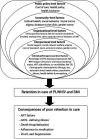Socio-demographic and clinical characteristics associated with retention in care among adults living with HIV and severe mental illness and reasons for loss to follow-up in Uganda: a mixed-methods study
- PMID: 37899147
- PMCID: PMC10619097
- DOI: 10.1136/bmjopen-2023-073623
Socio-demographic and clinical characteristics associated with retention in care among adults living with HIV and severe mental illness and reasons for loss to follow-up in Uganda: a mixed-methods study
Abstract
Objective: This study aimed to determine the socio-demographic and clinical characteristics associated with retention in care and reasons for loss to follow-up (LTFU) among people living with HIV (PLWH) with a known diagnosis of severe mental illness (SMI).
Design: We conducted a parallel convergent mixed-methods study. The quantitative study was used to determine the proportion and factors associated with retention in care among PLWH and SMI. The qualitative study explored reasons for LTFU.
Setting: This study was conducted at two the HIV clinics of two tertiary hospitals in Uganda.
Participants: We reviewed records of 608 PLWH who started antiretroviral therapy (ART) and included participants who had a documented diagnosis of SMI.
Outcomes: The primary outcome was retention in care. Age, gender, religion, tuberculosis (TB) status, WHO clinical stage, functional status, cluster of differentiation 4 (CD4) cell count, viral load and SMI diagnosis were among the predictor variables.
Results: We collected data from 328 participants. Retention at 6 months was 43.3% compared with 35.7% at 12 months. Having an unsuppressed viral load (≥1000 copies/mL) (adjusted incidence risk ratio (IRR)=1.54, 95% CI: 1.17 to 2.03), being 36 years and below (adjusted IRR=0.94, 95% CI: 0.94 to 0.95), initial presentation at outpatient department (adjusted IRR=0.74, 95% CI: 0.57 to 0.96), having TB signs and symptoms (adjusted IRR=0.98 95% CI: 0.97 to 0.99) and being in lower WHO stages (I and II) (adjusted IRR=1.08, 95% CI: 1.02 to 1.14) at ART initiation were significantly associated with retention in care at 6 and 12 months. Inadequate social support, long waiting hours at the clinic, perceived stigma and discrimination, competing life activities, low socioeconomic status and poor adherence to psychiatric medication were barriers to retention in care.
Conclusion: Twelve-month retention in care remains low at 35.7% far below the 90% WHO target. There is a need to design and implement targeted interventions to address barriers to retention in care among PLWH and SMI.
Keywords: Epidemiology; HIV & AIDS; INFECTIOUS DISEASES; MENTAL HEALTH; PUBLIC HEALTH; QUALITATIVE RESEARCH.
© Author(s) (or their employer(s)) 2023. Re-use permitted under CC BY-NC. No commercial re-use. See rights and permissions. Published by BMJ.
Conflict of interest statement
Competing interests: None declared.
Figures


References
-
- UNAIDS . Fact sheet; 2022.
Publication types
MeSH terms
Grants and funding
LinkOut - more resources
Full Text Sources
Medical
Research Materials
